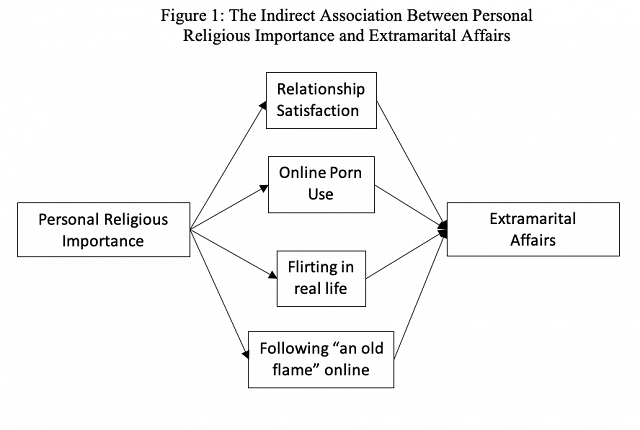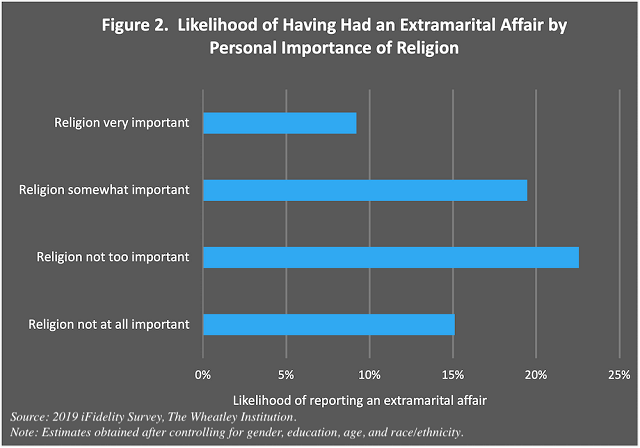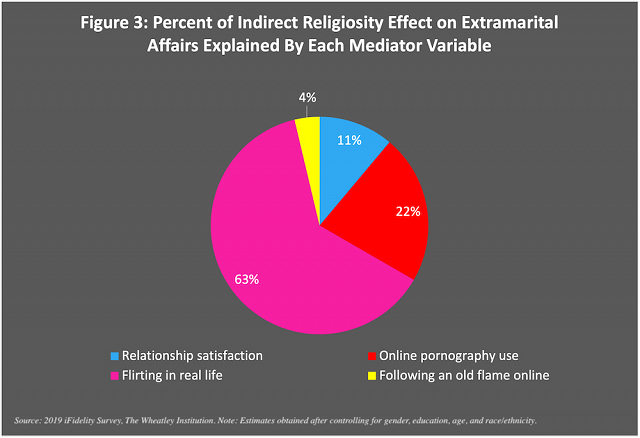Highlights
- Those who said that religion was personally “very important” had the lowest level of reported extramarital affairs. Post This
- Two of the main ways religion may prevent extramarital affairs is by preventing individuals from flirting with someone who is not their spouse and by reducing their use of pornography. Post This
Earlier this year, megachurch pastor Carl Lentz was fired due to “moral failures.” Lentz took to Instagram to clarify that he was unfaithful to his wife. This pastor’s infidelity is not the first time, religious or nonreligious, someone famous has cheated on a spouse—and will not be the last.
Given most world religions’ prescriptions on marital fidelity, Lentz’s behavior begs the question of whether religiosity, which we define as feeling that religion is an important aspect of one’s life,1 actually helps to prevent infidelity. Research generally suggests a negative relationship between religiosity and infidelity; as one is more religious, his or her likelihood of infidelity decreases, and vice versa.2 However, researchers have paid less attention to the reasons why religion and marital infidelity are negatively associated.
According to the General Social Survey (GSS), even today, most Americans believe that cheating on a spouse is wrong.3 As a society, we idealize marriage as a faithful, long-term, committed relationships (even if we do not live up to the ideal). To make real life marriages more like the ideal, understanding behaviors associated with marital infidelity is an important first step. Our study examined two factors that may make it less likely that religious4 individuals engage in extramarital affairs, including preventing behaviors that lead to affairs and religion- enhancing relationship satisfaction.
“Minor” Infidelity
One of the ways in which religiosity may reduce the likelihood of extramarital affairs is by reducing those behaviors that may escalate into full blown sexual infidelity. Extramarital affairs rarely occur in a day but progress over time—extramarital sexual behavior often starts with instances of “lesser” relationship infidelity that are not necessarily sexual in nature.5 This could include things like following an ex-partner on social media,6 flirting with someone in real life,7 and online pornography consumption.8
Religious individuals may engage in these behaviors less often. For example, those who are less religious tend to be view pornography more.9 Furthermore, those that have higher moral standards are less likely to engage in extramarital flirting than those who have lower moral standards.10
Relationship Satisfaction
On the opposite side of the spectrum, relationship satisfaction may help a spouse avoid infidelity. In fact, one study found that individuals who were “very happy” with their marital relationship were four times less likely to be unfaithful to their spouse than those who were “not too happy.”11 Because, research has linked different aspects of religiosity to relationship satisfaction,12 it may be that religiosity promotes relationship satisfaction, which then decreases the likelihood of an extramarital affair. Figure 1, below, presents our conceptual model.

Findings
We used data from the iFidelity Survey for this study. Conducted in late 2019, the iFidelity Survey questioned a nationwide sample of individuals regarding their fidelity attitudes and behaviors. Many of the participants were married, or had been married in the past, and it was these individuals whose data we used in our analyses.
Overall, one’s view of the importance of religion in one’s own life was negatively associated with the likelihood of reporting an extramarital affair. Interestingly, however, this relationship was more of a curve than a straight line (Figure 2). Those who responded that religion was either “not too important” or “somewhat important” were more likely to report having had an extramarital affair compared to those who suggested that religion was “not at all important.” Those who said that religion was personally “very important” had the lowest level of reported extramarital affairs.

In addition to testing whether religiosity and extramarital affairs were associated, we also tested factors that explain whythey relate. As noted above (Figure 1), we tested three types of “lesser” cheating (i.e., flirting, using online pornography, and following an old flame online) and marital satisfaction as potential mechanisms that might link religion and affairs.
In our model, 54% of the association between religiosity and extramarital affairs was indirect. That is, slightly more than half of the association between religiosity and affairs occurred because religiosity was working through other variables to decrease the likelihood of extramarital affairs.
The results from our analysis allowed us to calculate the percent of the indirect effect each of the different mediator variables shown in Figure 1. Together, flirting in real life and online pornography use explained 85% of the indirect effect between religiosity and reports of extramarital affairs (Figure 3). These two variables were statistically significant in our model. Relationship satisfaction and following an old flame online were not statistically significant.
Figure 3 suggests that one of the main ways in which religion may prevent extramarital affairs is by preventing individuals from flirting with a member of the opposite sex (i.e., who is not their spouse) in the first place. Given that flirting often signals romantic and/or sexual interest to a potential partner, religion might “build a wall” around marital fidelity by reducing this activity. Religion might also make infidelity less likely by reducing individuals’ use of pornography—an activity that research has been shown to be associated with extramarital affairs.

These data suggest that avoiding flirtation in real life with anyone other than a spouse and avoiding pornography use can be meaningful ways to avoid infidelity. Further, the findings also suggest that the more personally religious individuals are, the more likely they are to avoid even these “minor indiscretions.”
Jeffrey Dew is an associate professor in the School of Family Life at Brigham Young University, a fellow at the National Marriage Project, and a fellow of the Wheatley Institution at BYU. Matthew Saxey is a Family Studies Master's Student at Brigham Young University and current Wheatley Institution Student Scholar and Graduate Student Employee. Jolyn Schraedel is a master’s student at Brigham Young University.
1. Religiosity is a multi-faceted construct with religious worship service attendance, denominational affiliation, and integration within one’s religious community all playing a role. We focus on this one issue – personal religious importance – because we believe it is most associated with extramarital affairs.
2. Fincham & May, 2017.
3. Wilcox, Dew, & VanDenBerghe, 2019.
4. We acknowledge that religiosity is a multifaceted construct. Unfortunately, our measures of religiosity (e.g., personal importance, worship service attendance) were so highly correlated that we could only test one. We present the analyses that used personal religious importance, though the findings were similar with other measures of religiosity.
5. Rodriguez, DiBellow, Øverup, & Lin, 2018.
6. Wilcox, Dew, & VanDenBerghe, 2019.
7. Alapack, Blichfeldt, & Eden, 2005.
8. Lambert, Negash, Stillman, Olmstead, & Fincham, 2012.
9. Perry, 2017.
10. Ziv, Lubin, & Asher, 2018.
11. Atkins, Baucom, & Jacobson, 2001
12. For a review, please see Mahoney, 2010













